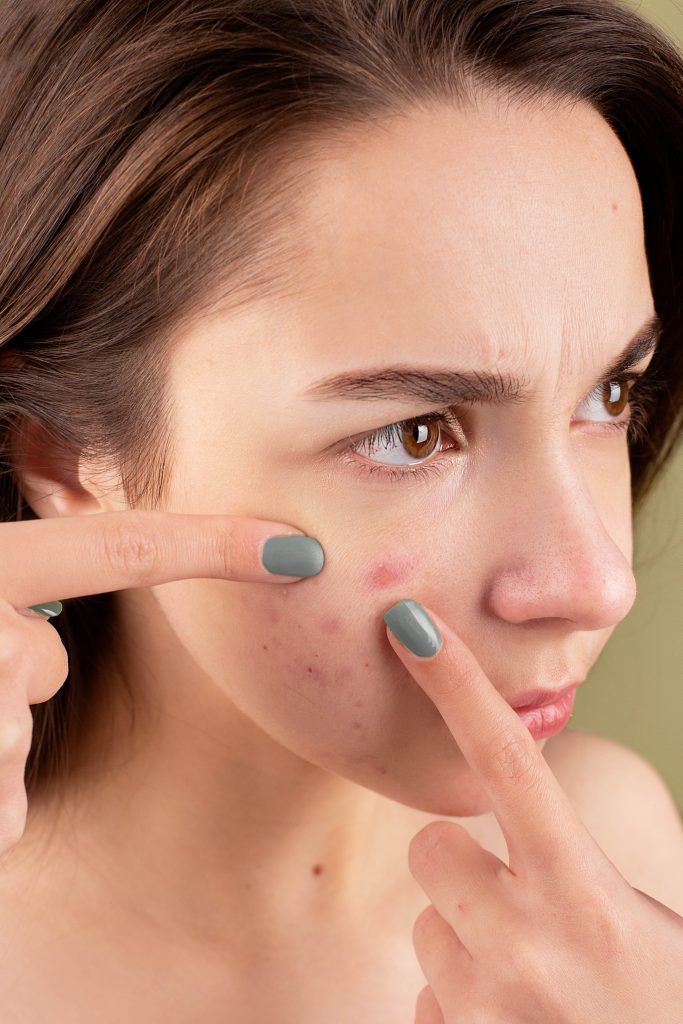Essential Tips for Effective Acne Treatment
For optimal results in your acne treatment, dermatologists who are board-certified recommend the following tips:
- Maintain Clean Skin: Wash your face gently up to twice a day and after sweating. Opt for a mild, non-abrasive cleanser and apply it using your fingertips to avoid irritating the skin. Refrain from scrubbing with washcloths or sponges, as they can cause further irritation.
- Choose Suitable Skincare Products: Select gentle skin care products labeled as “alcohol-free.” Avoid using astringents, toners, and exfoliants, as they can dry out the skin and exacerbate acne. Such products may give the appearance of worsening acne.
- Regularly Shampoo: Oily hair can contribute to acne on the forehead. If you have oily hair, increase the frequency of shampooing and prevent hair from touching your face.
- Be Consistent with Treatment: Avoid switching between acne treatments frequently, as it can lead to skin irritation and breakouts. Allow sufficient time for the treatment to work, as noticeable improvements may take several weeks to months.
- Hands Off: Refrain from touching your face throughout the day, as it can trigger acne flare-ups. Avoid picking, popping, or squeezing acne lesions, as these actions prolong the healing process and increase the risk of scarring and post-inflammatory hyperpigmentation.
- Sun Protection: Protect your skin by avoiding sun exposure and tanning beds. Both can worsen acne and damage the skin. Certain acne medications can increase the skin’s sensitivity to harmful UV rays. Seek shade, wear sun-protective clothing, and apply a broad-spectrum, water-resistant sunscreen with an SPF of 30 or higher to exposed skin. Look for non-comedogenic sunscreen that won’t clog pores. For enhanced protection, choose clothing with a UPF (ultraviolet protection factor) rating.
- Be Patient: Acne treatment requires time. If breakouts persist despite following these tips, it is advisable to consult with a board-certified dermatologist. Dermatologists can provide effective treatment for existing acne, prevent new breakouts, and reduce the risk of scarring.
Key Points for Acne Management:
- Moisturize: Counteract dryness caused by acne products with a moisturizer that minimizes skin peeling. Look for “noncomedogenic” on the label to ensure it won’t cause acne. Choose a moisturizer suitable for your skin type, be it oily, dry, or combination skin.
- Over-the-Counter Acne Products: Consider trying OTC acne products that don’t require a prescription. Look for ingredients like benzoyl peroxide, salicylic acid, glycolic acid, or lactic acid, as they help control bacteria and dry out the skin. Start with a small amount to avoid excessive drying or peeling, and gradually adjust the frequency and quantity of product application. If you have sensitive skin, use these products with caution. An alternative is an OTC topical retinoid gel, such as Differin 0.1% gel, which works to prevent acne formation.
- Limit Makeup Usage: During breakouts, it’s best to avoid wearing foundation, powder, or blush. If you choose to wear makeup, ensure you wash it off at the end of the day. Opt for oil-free cosmetics without added dyes and chemicals whenever possible. Look for makeup labeled as “non-comedogenic” to minimize the risk of acne. Always read the ingredient list on the product label before making a purchase.
- Incorporate Daily Exercise: Engaging in regular physical activity benefits your overall well-being, including your skin. However, be mindful of clothing and exercise equipment that may rub against your skin and cause irritation. It’s recommended to shower or bathe immediately after exercising to cleanse the skin.
- Manage Stress Levels: Research suggests a correlation between stress and the severity of pimples or acne. Take a moment to identify the factors causing stress in your life and seek potential solutions to address them. Prioritizing stress management can contribute to improved skin health.
Remember, consistent adherence to a proper skincare routine and professional guidance are key to managing acne effectively.
